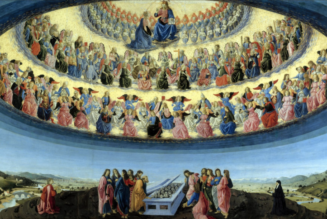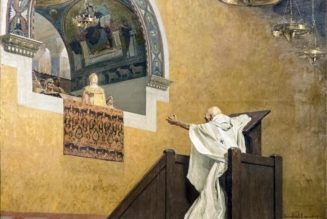, January 16, 2020
 There is no greater joy in this world than encountering Jesus.
There is no greater joy in this world than encountering Jesus.
There is no greater peace than being in communion with God.
No work is as satisfying as work that you know pleases him.
These are three rock-bottom truths that the world, the flesh and the devil continually lie to us about (and that we lie to ourselves about) but the Church brings them into sharp focus in the readings for the Second Sunday in Ordinary Time, Year A.
A real encounter with Jesus floods you with happiness.
Many people practice the recognition of God with various prayers. A morning offering may pray, “let me see you, Lord, in the events of every day.” At the elevation of the host, many pray, “My Lord and my God” (and “My Jesus, mercy,” at the elevation of the chalice).
These prayers are reaching for what John the Baptist did, according to the Gospel: “John the Baptist saw Jesus coming toward him and said, ‘Behold, the Lamb of God, who takes away the sin of the world.’”
Jesus here isn’t in a remarkable story with Shepherds, mangers, or Magi; he isn’t performing miracles, dying on a cross, or rising from the dead. He is simply walking by. And his presence alone is exciting enough to make John cry out.
“There are in truth three states of the converted,” wrote St. Gregory the Great. “The beginning, the middle and the perfection. In the beginning they experience the charms of sweetness, in the middle the contests of temptation, and in the end the plentitude of perfection.”
The special times in the Church provide the sweetness: Loving Jesus when he is doing something extraordinary. But you can’t make it past the temptations to the time of perfection unless you discover the excitement and joy of seeing Jesus in your daily life.
That means that Christian life usually begins with finding God where you are, and saying “Behold, the Lamb of God.”
To do this you must recognize him where you are, and note when you do.
But peace only remains through receptivity.
Receptivity is a key Christian virtue that we don’t hear discussed often. It’s our openness to accepting and internalizing God’s direction — his plan, his truth, the people and circumstances he put in our lives.
An activist who lacks this virtue will be too busy doing what he imagines to be God’s will, on his own terms, to stop and hear God. To practice receptivity means being contemplative before being active — because it isn’t your actions that matter, it’s your energetic participation in God’s action.
Paul describes Christian receptivity in the Second Reading, which is essentially just the first line of a letter. It is worth being a stand-alone reading, though, because it describes the essence of what it means to be Christian: being “sanctified in Christ Jesus, called to be holy, with all those everywhere who call upon the name of our Lord Jesus Christ.”
John sees an example of receptivity in Jesus Christ. In his beautiful description, “I saw the Spirit come down like a dove from heaven and remain upon him.” The Spirit remains where he is received.
In this case, when the Baptist cries out “Behold the son of God,” nothing comes from it. The next day, according to the Gospel of John, when the first apostles hear his exclamation, they will be models of receptivity. They will go to Christ, but they won’t say, “Master, what must we do?” Instead, they will say, “Where do you live?”
The beginning of Ordinary Time is not a time to remember the extraordinary events of Christ’s story — that time will come. it’s time to invite him to remain in our everyday lives.
But ultimately, the Christian life doesn’t exist merely to deliver personal happiness or emotional peace.
It exists for much more.
“It is too little, the LORD says,” in the First Reading, “for you to be my servant, to raise up the tribes of Jacob, and restore the survivors of Israel; I will make you a light to the nations, that my salvation may reach to the ends of the earth.”
We might translate that: “It is too little for you to gather around me and make me your own. You must broaden the circle to include more and more.”
The Psalm sums it up.
First, the recognition: “I have waited, waited for the Lord, and he stooped toward me,” it says. Then, the receptivity: He “put a new song in my mouth,” it says. Finally, our answer: “Here am I, Lord; I come to do your will.”
Image: Raven Memorial Park at Benedictine College in Atchison, Kansas.
Tags: prayer, Second Sunday of Ordinary Time (Year A), Sunday Gospel, Sunday Readings
Never miss a post! Subscribe below to our weekly newsletter.









